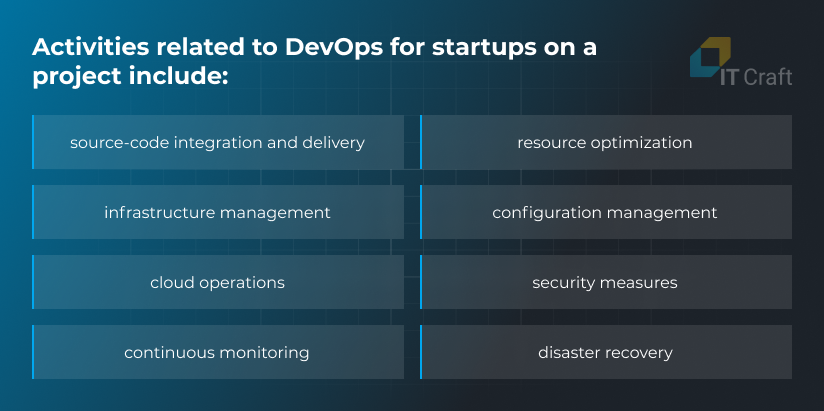DevOps for startups is a growing trend. According to the 2023 State of DevOps Report on Platform Engineering, 60% of businesses implementing DevOps practices report have increased software reliability and 59% increase in productivity.
According to a survey by Atlassian, 99% of participants have witnessed positive changes after DevOps introduction. Almost half have increased delivery pace, requiring less time to launch functionality.
However, hiring an in-house DevOps engineer might be a risky investment for startups. The scope of DevOps services on a startup’s work fluctuates substantially by milestones, making an in-house hire an inefficient and costly decision.
DevOps as a Service helps your startup: you access missing expertise for a reasonable investment.
Check out how DevOps for startups works and what it brings to your project. We also examine how you can start successful cooperation quickly.
1
What is DevOps as a Service?
DevOps as a Service basically means DevOps outsourcing. Clients take the burdens and responsibilities off their shoulders by contracting a third-party organization that provides DevOps experts. Depending on scope and deadline, clients can ask for DevOps as a service, use IT staff augmentation, or opt for a dedicated team.
By using DevOps as a Service, you extend your Agile team, uniting development and maintenance stages into a seamless process.
This is how:
As a digital startup, you need DevOps for startups to:
- launch a product
- solve any and all problems related to its use—quickly
- provide enhancements and new features with little-to-no interruption of user activities
These activities are divided between two different teams on a project. A workflow gap between them exists; DevOps engineers close the gap by:
- unifying working environments and processes across teams
- introducing test and deployment automation
- keeping up with industry best practices
Hence, DevOps service enables you to reach your business goals more efficiently and cost-effectively.
Now, let’s dive deeper into the details.
What are DevOps Activities?

DevOps harmonize workflow. DevOps engineers address concerns and challenges of software maintenance at the early Sprint stages. Hence, DevOps for startups decreases developers’ stress load of having to make last-minute fixes because issues slip unnoticed into the production stage on a fast-paced project.
The key components of a DevOps-enhanced lifecycle include:

DevOps engineers do not directly participate in coding. Still, they increase a development team’s productivity by deploying development environments, automating tasks, and helping with version control.
The development team adds new components to the code base within seconds using a pipeline prepared by DevOps. Multiple source code updates per day become possible.
DevOps engineers incorporate test automation (regression testing, integration testing, API testing, etc.). Continuous testing a crucial part of DevOps for startups alongside Continuous Integration.
The team deploys integrated source code on servers using containers. Deployment takes only several seconds. It enables the team to deliver enhancements as soon as they are ready.
The team collects information about app performance, detected issues, and user suggestions. The team uses it for further improvements.
This step on the operations side enables engineers to detect emerging issues (e.g., leaking memory, untypical user load, crashes, and more) and address them immediately.
DevOps for startups focuses on introducing improvements into development processes, helping the team harmonize workflow, increase efficiency, and decrease delivery time.
How Does DevOps as a Service Work?
Usually, founders consider DevOps for startups when they have a product up and running. They are looking for enhanced capabilities.
To increase cooperation bottom line, IT Craft DevOps engineers apply the following five-step flow:

01 Project assessment
They get into project details. Engineers study project goals, requirements, and infrastructure.
02 Roadmap
The DevOps team offers a plan for improving processes and removing bottlenecks. It discusses project details with the client.
03 Implementation
DevOps engineers implement the plan, addressing critical points first and less critical next.
04 Performance analysis
A comprehensive analysis follows implementation, ensuring performance parameters indicate improvements.
05 Continuous support
IT Craft engineers help the client’s team monitor software, scale, or optimize infrastructure—anything and everything that is required.
How does DevOps for startups help?
Here are some of the many important tasks on a startup project that DevOps experts complete daily:
- Create and delete millions of software copies automatically, balancing user load and eliminating downtime.
- Detect and eliminate unused resources; optimize resource usage by services, decreasing maintenance costs and increasing ROI of DevOps for startups.
- Ensure users can work with the software while developers continue to deliver updates seamlessly without users even noticing the server is under maintenance.
- Monitor and improve software infrastructure, ensuring user data is safe, secure, and available for its owners.
- Decrease the timeline required for code delivery. Support regular code shipments of any size: feature deliveries, bug fixing, or necessary updates.
- Increase software consistency through automated testing—new code does not negatively affect the existing codebase.
2
Reasons for DevOps Outsourcing for Startups
Startups need DevOps services more than any other type of business.
Why?
The following reasons affect the decision on DevOps adoption:
Cost optimization
DevOps for startups saves a substantial part of the maintenance budget by optimizing resource waste. First, DevOps engineers analyze the structure of expenses. Then, they find resources the team does not need or uses inefficiently. Next step, they introduce improvements.
Increased productivity
DevOps finds bottlenecks and automates routine jobs; this shifts tedious, routine tasks to machines. DevOps engineers automatically create scripts to deploy testing environments, ensuring QAs test software in real conditions. The team completes tasks on time while the machine checks for errors.
Software stability
DevOps engineers are neither in the developers’ nor administrators’ camp. They connect both teams, ensuring everyone stays in tune and in touch, knowing the other’s issues and challenges. DevOps for startups helps address software issues in new releases. Software behavior becomes predictable, requiring fewer maintenance efforts and urgent improvements.
Decreasing timeline
DevOps service accelerates deliveries. Deployment automation or rolling-out updates to a product can save a team a lot of time—and the owner money.
Your team ships more features within the same timeline. Or launches the same scope faster.
Migration
Often, third-party services permanently shut down; data centers increase prices or cannot support app growth. DevOps helps create scripts to port software seamlessly to a new data center or service and oversee the migration process in these cases.
What makes outsourcing DevOps for startups a better option than an in-house hire?
Two reasons:
- Cloud-related roles are among the hardest to fill in . You must allocate much time and resources to an effective hire, which you do at the cost of project pace. The result can be slowed-down deliveries, an extended deadline, or decreased software consistency.
- Hiring an in-house specialist might not be the best solution for you. As a startup, you might need several DevOps engineers to build infrastructure and tune processes. You will need only a part-time specialist for support and updates when the job is done.
As a result, your high initial investment might not pay off in the long term unless you face immediate, intensive growth.
3
DevOps for Startups: Technology Stack
It is essential that you know what instruments are used in your project and why.
First, many open-source instruments are available for DevOps engineers to cover specific activities. You need the best for your particular needs.
Second, you select DevOps engineers who are experts in working with your instruments.
For instance, IT Craft DevOps engineers rely on various tools and technologies to fulfill their duties. The most important include:

4
How to Get Started with DevOps for Startups?
You need to find a reliable service provider as your first step. As the next steps, you determine a cooperation framework.
For instance, IT Craft offers its clients a four-step process, ensuring a successful project start:

01 Initial request
Schedule a call with our experts in DevOps for startups by sending a message. We sign an NDA to ensure you feel safe in discussing goals and project details.
02 Analysis
Our DevOps experts study the current state of your system. They prepare an improvement plan based on your requirements.
03 Clarification
We clarify tech improvements and cooperation details until any possibility of misunderstanding is eliminated and an agreement is reached.
04 Kick-off
We sign an agreement once the scope, price, and cooperation terms are clear. Cooperation starts. The team makes improvements.
5
Meet Your Goals with StartOps Package
There is more for you at IT Craft.
We know how hard it is for startups to get so much sought-after expertise on time and at an affordable price.
Here is why our team has designed a special “DevOps for startups” package, StartOps—we have adapted DevOps practices to the startup needs based on our experience of enhancing our clients’ products.
Yet, startups are so different. Will StartOps cover my startup without my having to pay for the services I will not use?
Yes, it will. The package includes the six most-requested options to help you grow, expand, optimize operations, and reach 24/7/365 software availability—whatever you envisage.
These options are:
- Architectural patterns – build or adjust app architecture
- Cloud/on-premises operations – improve software infrastructure
- Automation – introduce CI/CD pipeline
- Reliability – enhance software stability
- Monitoring – efficiently oversee system performance
- Customer Support – assist with consultancy and troubleshooting
!
Summary
The bottom line: DevOps for startups speeds up delivery time. DevOps’ approach works well for startups who constantly want to optimize their software solution. It shortens delivery time and ensures more sustainable app development for startups.
Once the software is live, DevOps backs up more effective resource management while saving maintenance expenses.
Finally: you prevent burnout by applying DevOps for startups. People cannot fully engage with development and maintenance over time because switching is difficult and time-consuming. We are here to help you retain your team.








